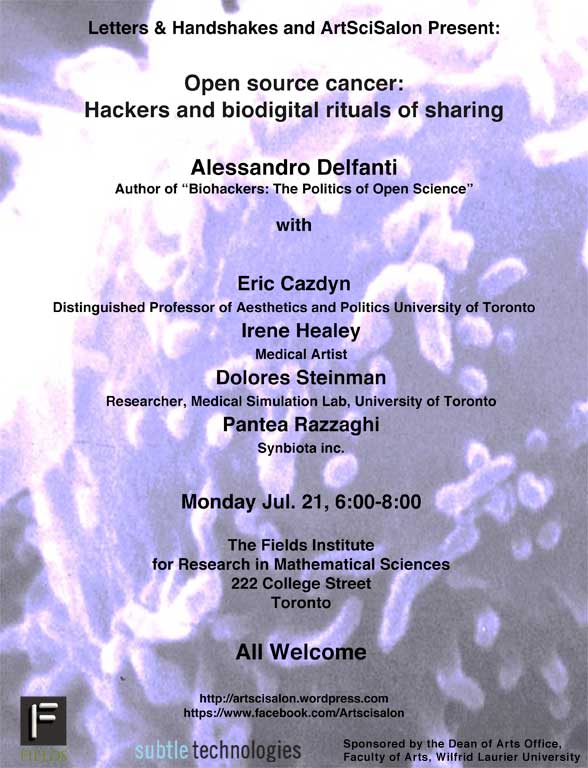Open Source Cancer: Hackers and Biodigital Rituals of Sharing
Alessandro Delfanti in conversation with Eric Cazdyn, Irene Healey, Pantea Razzaghi, and Dolores Steinman
Moderated by Roberta Buiani
Presented by Letters & Handshakes and ArtSci Salon
Sponsored by the Dean of Arts Office, Faculty of Arts, Wilfrid Laurier University and supported by the Fields Institute for Research in Mathematical Sciences
Monday, July 21, 2014
6:00-8:00pm
The Fields Institute
222 College St.
Room 230
Free and open to the public
Please join us for a conversation exploring the politics of cure at the intersection of open science, network culture, clinical practice, and biocapitalism. A presentation by Alessandro Delfanti on the concept of a biodigital ritual of sharing will be followed by talks by theorist Eric Cazdyn and medical artist Irene Healey, with responses from researcher Dolores Steinman and science communicator Pantea Razzaghi
Alessandro Delfanti | Open Source Cancer: Hackers and Biodigital Rituals of Sharing
Through the website La Cura (the cure), the Italian designer and hacker Salvatore Iaconesi open sourced his cancer. He shared medical data and information related to his brain tumor and received hundreds of thousands of cures from patients, physicians, activists, artists, designers, and other peers. His condition was turned into a global performance of de-medicalization. In order to do this, he had to hack his medical records and convert them into open formats, to make data easily readable and shareable, as well as to construct an inclusive understanding of the word “cure”. Beginning from the case of La Cura, in this presentation, Delfanti will propose the concept of a “biodigital ritual of sharing”, a protocol or script, dense with meaning, that is adapted from hacker cultures’ public practices: hack into data owned by institutions, share them in the open, and build a community which can make unpredictable use of the data. While in the context of medical institutions data represented an objectification of the body, their reinscription through the ritual helped constitute a body politic that could interpret them as a symbol for a reconfiguration of the experience of cancer. Against techno-determinist utopias of distributed innovation, Delfanti analyzes the biopolitical side of open source. Following feminist theory, he suggests that, when facing illness and disability, digital cultures imagine and perform technologies as social and relational rather than bodily prosthesis.
Eric Cazdyn | Cure as Form
Irene Healey | (Re)membering: Observations on the Desire for Restoration After an Altered Identity
Discussants | Pantea Razzaghi and Dolores Steinman
Bios
Alessandro Delfanti is a postdoctoral fellow at the research hub Media@McGill at McGill University, where he works on the role of participatory media in biomedicine and teaches a seminar on Online Cooperation. Before moving to Quebec he obtained a PhD in Science and Society and then taught Sociology of New Media at the University of Milan. In Fall 2014, he will begin a two-year postdoctoral fellowship at the University of California, Davis, where he will work on the evolution of scholarly communication. As a journalist he writes about science politics and digital cultures for several Italian newspapers and magazines. His first book is titled Biohackers: The Politics of Open Science (Pluto Press 2013).
Eric Cazdyn is Distinguished Professor of Aesthetics and Politics at the University of Toronto. He teaches courses on critical and cultural theory, psychoanalysis, Marxism, film and video, architecture, illness, literature, and Japan. He has written the following books: The Already Dead, After Globalization (with Imre Szeman), and The Flash of Capital; and is editor of Trespasses and Disastrous Consequences. Cazdyn’s newest book, Nothing (with Marcus Boon and Timothy Morton), is an attempt to reclaim for our present moment three desires that are regularly laughed out of polite conversation: “Enlightenment”, “Cure”, and “Revolution”. Cazdyn is also a filmmaker. His films have been screened and performed in Japan, Canada, the US, Europe and, most recently, in the UK as part of a two-week residency at The Cube Microcinema (Bristol) with Eric Chenaux.
Irene Healey is a practising visual artist and a medical artist who maintains an independent clinical practise seeing individuals for custom made external body prostheses. She combines her knowledge of art and science with medicine and technology. She is a graduate of the Art as Applied to Medicine program in the College of Medicine at the University of Toronto.
Pantea Razzaghi is Chief Culture/Design Officer of Synbiota Inc.. She is responsible for the culture, communication and design of the Synbiota open science platform. With a strong focus on simplifying complex scientific workflows and interactions, Pantea keeps a close eye on various cultural pockets incubating in the sphere of open science, and applies those findings to create useful, intuitive and enjoyable user experiences optimized towards scientific discovery for the masses.
Dolores Steinman was trained as a Paediatrician and, upon relocating to Canada, obtained her PhD in Cell Biology. Currently she is a Research Associate in the Department of Mechanical Engineering at the University of Toronto and a volunteer Docent at the Art Gallery of Ontario. In her research she observes the rapport and the connection between medical imagery and its non-scientific counterparts. Her pursuit is driven by her keen interest in placing increasingly technology-based medical research in the larger context of the humanities.
Comments are closed